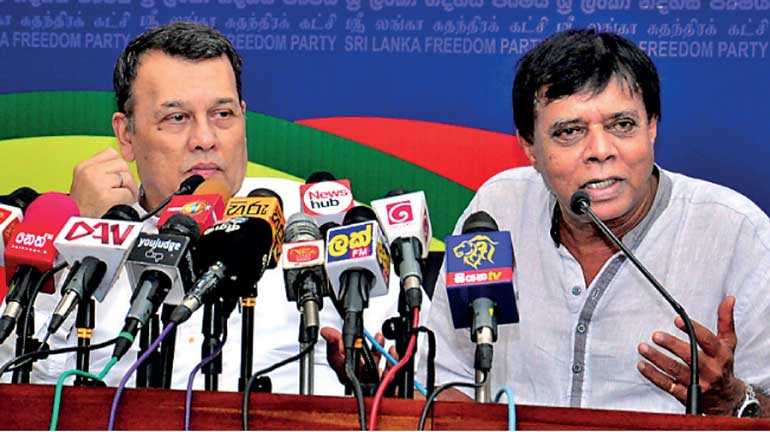Sunday Feb 15, 2026
Sunday Feb 15, 2026
Tuesday, 13 November 2018 01:06 - - {{hitsCtrl.values.hits}}

SLFP General Secretary Prof. Rohana Lakshman Piyadasa and SLFP spokesman Mahinda Samarasinghe addressing reporters yesterday – Pic by Sameera Wijesinghe
By Uditha Jayasinghe
The Sri Lanka Freedom Party (SLFP) remained unperturbed by the spate of members leaving its ranks to join the Sri Lanka Podujana Peramuna (SLPP) yesterday, insisting that its main goal was winning a Parliamentary majority in the likely event of elections.
Over the weekend, Prime Minister Mahinda Rajapaksa, together with his son Namal Rajapaksa and several dozen SLFP members, took SLPP membership. More key members within the SLFP ranks are expected to accept SLPP membership over the coming days. Political experts have pointed out that the SLFP runs the risk of becoming a less effective party within the United People’s Freedom Alliance (UPFA), ceding pole position to the SLPP.
SLFP General Secretary Prof. Rohana Lakshman Piyadasa yesterday noted that the SLFP had faced many challenges in its long history, and the loss of membership was a “secondary issue” when compared with the need to build a broad coalition to face a possible General Election on 5 January.
He emphasised that the priority the SLFP is focused on is building a board coalition including political parties, academics, religious leaders and civil society to establish a new Government.
“In the history of the SLFP, we have even seen instances when the children of the party leader left the SLFP, but later came back. Crossovers are now part and parcel of the political landscape of Sri Lanka, and we must accept this. It is not just us that is building a coalition. Look at the United National Party (UNP), they have also evolved into the United National Front (UNF). Our focus is building the best coalition to face the next election,” he told reporters.
Prof. Piyadasa also stressed that irrespective of their members, all parties within the coalition are equal. In his view, there is little danger of SLFP losing its high ground as the goal of all parties within UPFA is supporting Prime Minister Mahinda Rajapaksa to win the general election.
Echoing Prof. Piyadasa’s views, SLFP spokesman Mahinda Samarasinghe also rubbished claims of SLFP being side-lined within the UPFA, insisting that the results of the Local Government elections in February were not necessarily a reflection of his party’s popularity.
“The Local Government elections were clearly an anti-Government vote. SLFP fared badly in that election because we were lumped together with the UNP. The people expressed their dissatisfaction with the UNP. I do not believe that it was necessarily a vote against the SLFP. With the SLFP returning to UPFA, we are also able to follow the policies we have always championed, which are focused on left-leaning, pro-people ideals,” he said.
Samarasinghe also defended President Maithripala Sirisena’s address to the nation on Sunday, arguing the decision to dissolve Parliament was taken as there was no other choice available. Reiterating that President Sirisena did not misuse Constitutional powers to remove Prime Minister Ranil Wickremesinghe and appoint Prime Minister Mahinda Rajapaksa, he contended that reconvening Parliament became contentious due to the actions of Speaker Karu Jayasuriya.
Samarasinghe also repeated the allegation that Jayasuriya would have prevented the “Throne Speech” from being delivered. Jayasuriya, releasing a statement on Sunday, denied he would have done so and stood by his efforts to call for a vote to decide Parliamentary majority on 14 November.
“It was evident to us that the Speaker was going beyond his powers. He does not have the authority to send letters to diplomats based in Colombo and make statements to international media. The Speaker cannot disregard Standing Orders, which is against tradition. The Speaker has said that he was handed a letter signed by 116 MPs but we have not seen that letter.”
Samarasinghe claimed that given these developments President Sirisena felt that reconvening Parliament would have been fraught with challenges and detrimental to the image of Sri Lanka and therefore, instead, chose to dissolve Parliament.